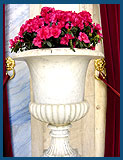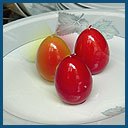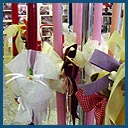
|
|
|
|

EASTER, THE MOST CELEBRATED
AND SACRED OF ALL GREEK holidays, glorifies the Resurrection, or "Anastasi",
of Jesus Christ. This very important religious event is also connected
to the rebirth of the nature. Easter is called in Greek "Pasha",
meaning "Passover", in fact the passing from life to death and
from earth to heaven.
The Easter celebration begins with a 40-day fast and one week is chosen for the complete fast. The week before Easter is called "the Holy Week", or "Megali Evdomada", when churches are full, every evening, with the people of all ages who follow the Orthodox traditions.
The Easter celebration begins with a 40-day fast and one week is chosen for the complete fast. The week before Easter is called "the Holy Week", or "Megali Evdomada", when churches are full, every evening, with the people of all ages who follow the Orthodox traditions.
|
|
|
|
||||||
|
The Saturday before Palm
Sunday, a week before Easter Sunday, is called the Saturday of Lazarus,
and children go, from door to door, singing Lazarus' hymn, for which
they are rewarded with money and eggs.
On the morning of Palm Sunday, people gather in churches and are given a cross made of palm fronds, which they put on their icon-stands at home and keep it for the whole of the coming year . On Holy Tuesday, housewives make sweet rolls or "koulourakia", they do the housework, and in the evening they go to the church and follow the blessing of the Holy Oil. The Holy Thursday is the day for dyeing eggs. In Christianity, the egg is a symbol of Resurrection, representing the emergence of Christ from his tomb to everlasting life. In Greece, eggs are usually coloured in red ("kokkina pashalina avga"), like the blood of Christ. Hard-boiled eggs are used, which are baked into twisted sweetbread loaves, and distributed on Easter Sunday. People rap their eggs against their friends' eggs and the owner of the last egg that was not cracked is considered lucky. In the evening, at the church the girls undertake the decoration of the bier of Christ, or "epitaphios", with garlands of white and purple flowers. Good Friday - day of mourning and drama for the death of Christ - is followed with great devoutness. In order to express their love for Christ, who was given vinegar to drink, the Greeks eat on this day soup made with sesame-paste, lettuce or lentils with vinegar. Meat is not allowed. On the evening of Good Friday, a procession representing Christ's funeral procession takes place at the church. Choirs sing solemn music, followed by the clergy, women bearing myrrh, the altar boys carrying the liturgical fans, scouts and guides, people of all ages. They all sing hymns all along the procession. As the procession proceeds, people scatter flowers on the bier, or "epitaphios", holding lit candles in their hands. On the Holy Saturday, the ceremony of candle lighting is the most important moment. The priests exit the altar carrying a candle, and people light their own passing its flame from candle to candle. Then bells ring out joyfully at midnight and people kiss each other saying "Hristos Anesti" and "Hronia Polla". According to the tradition, the Christians take home their lit candles with the holy light of the Resurrection and, before entering their houses, they make a cross with the smoke of the candle on top of the door. The meal of the most important day consists of "magiritsa". Then, red eggs are knocked while greeting each other with the traditional "Christ is risen" ("Hristos Anesti") and the other answers "Truly he is risen" ("Alithinos Anesti"). One of the Christian symbols most often associated with Easter is the Lamb. The following day, the tradition gathers the family together and they roast a lamb, or "arni pashalino tis souvlas", in courtyards. |
||||||
GREEK EASTER FOOD:
Easter midnight soup - "Magiritsa"
Easter lamb on the spit - "Arni Pashalino tis souvlas"
Red-dyed eggs - "Kokkina avga"
Baked potatoes with oregano - "Patates sto fourno riganates"
Easter bread - "Tsoureki"
GREEK EASTER WISHES:
Happy Easter - "Kalo Pasha!"!
Christ Is Risen! - "Hristos Anesti!"
Truly He Has Risen! - "Alithinos Anesti!"
Have a Good Lent! - "Kali Saracosti!"
Easter Wishes - "Hronia Polla!"
 |
||
 |
||


